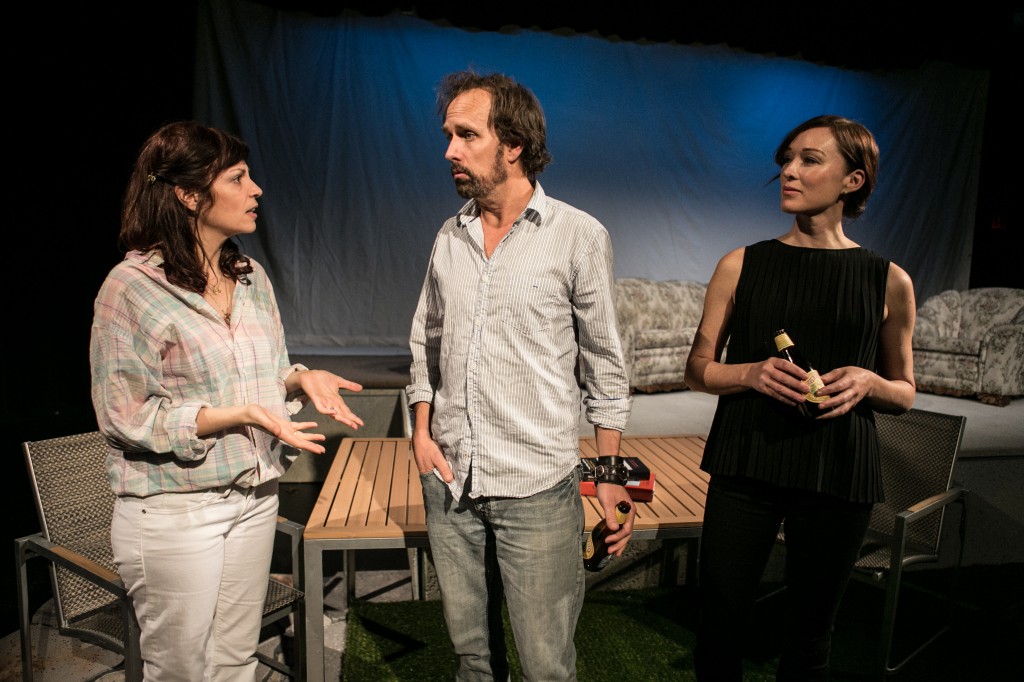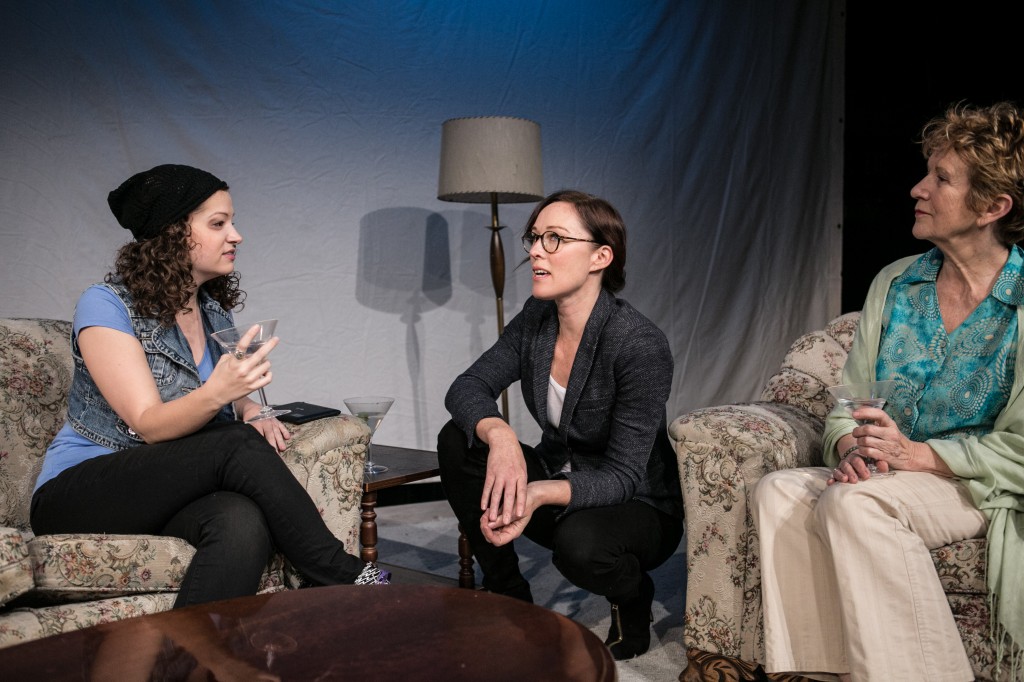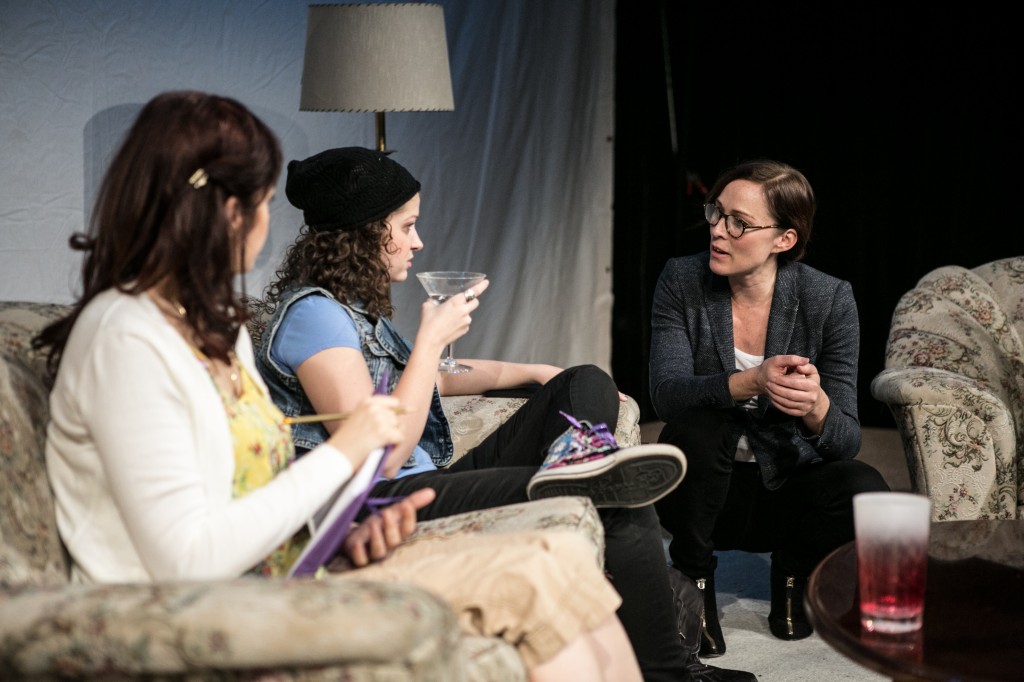
Credit: Shimon Karmel
At Studio 16 until November 28, 2015
brownpapertickets.com/or at the door
Posted November 14, 2015
Mitch and Murray Productions knocks it out of the park – again – with Gina Gionfriddo’s Rapture, Blister, Burn, a finalist for the 2013 Pulitzer Prize for Drama.
Any female over the age of seventeen or eighteen considers this: “Shall I give up a career (or the possibility thereof) to marry and have children?” or “Shall I forgo marriage and children to pursue a career?” Some of us think we can have it all. We can but there’s a price to pay and it’s called sanity.
Once the kids have left home, the married women wonder if they made the right choice. The career women, once they retire, wonder if they missed out on a family. It’s about the grass being greener on the other side of the career/marriage divide.
Gionfriddo gives us three generations of women: Alice (Anna Hagan), in her 70s – the generation of women that warned their daughters against sex before marriage with, “Nobody buys the cow when the milk is free.” Then there’s her daughter Catherine (Moya O’Connell), early forties, unmarried, childless, an accomplished academic who teaches and writes about feminism and the politics of pornography. Gwen (Lori Triolo), also early 40s, was Catherine’s best friend in grad school but when Catherine went to London, Gwen married Catherine’s boyfriend Don (Robert Moloney). He smokes dope, watches porn, is under-employed and is the father of their two children. And then there’s twenty-one year old Avery (Courtney Shields), Don and Gwen’s babysitter, who thinks she has the world by the balls. These three generations aren’t just ‘gap-ing’ they’re gaping.

Credit: Shimon Karmel
Catherine, the academic, does go on about Betty Friedan and Phyllis Schlafly, but if you were there and conscious in the 60s, you’ve read them both or are familiar with their position vis-à-vis feminism. Friedan, of course, was the great liberator: freedom of choice for women; Schlafly wrote that the world would end if women went to work and gave up homemaking and child rearing.
The script gets a bit dense but it’s so smart. And for Catherine, Gwen and Avery, the stakes – as it turns out – are high.
I believed every one of these characters. Triolo, as Gwen, is so desperately ‘wired’. A recovering alcoholic and miserable stay-at-home mom (with a graduate degree), she’s unfulfilled. Triolo almost hyperventilates when telling Catherine how great everything is. What else can she say in the face of Catherine’s success?
O’Connell wears Catherine’s confidence like a scarf she can put on or take off. But when that scarf is off, she’s just as miserable as Gwen. It just takes her longer to spill the beans.
Shields’ Avery actually is confident with a boyfriend she’s sleeping with but not even considering marrying. Children? No way. Shields gets most of the best lines and her character unflinchingly tells it like it is – or, like it is when you’re twenty-one. Alice finally says what everyone over fifty in the audience is thinking: “You are so young”.
Of the three women, the only one reasonably satisfied with her life is septuagenarian Alice. Husband gone, health still good, her only concern is Catherine, “Your worry is shortening my life.”

Credit: Shimon Karmel
Moloney’s portrayal of Don makes him smart but not smart enough (or maybe simply lacking ambition). He’s a “stoner and a loser”, according to babysitter Avery, but he’s likeable in a hapless, desperate way. Don is ready to “embrace” his “mediocrity and ambivalence.” Gwen already has. He’s a drowning man trying to decide whether to cling to the wreckage, try to reach shore or just smoke a joint.
Directed by Aaron Craven, Rapture, Blister, Burn is blisteringly true and rapturously funny. “Freedom”, says Alice, raising her glass enthusiastically as the curtain falls. Are they smiling? Not so much.

